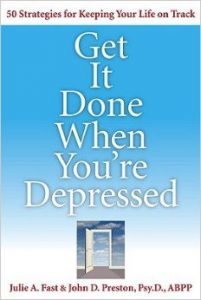Julie A. Fast's Blog, page 25
March 30, 2018
World Bipolar Day with Julie A. Fast
#WorldBipolarDay means that I can talk openly about my illness. It’s just an illness. We are not weird. We are not freaks. We have a genetic illness. But wow, it sure is hard to manage! We need help and your understanding. That’s for sure! It’s great working with The International Bipolar Foundation and talking about #BipolarStrong. We can be honest about what we experience. Julie
March 26, 2018
Why I Keep Taking My Bipolar Medications

A friend of mine with bipolar one just had to up her Latuda due to paranoid psychosis. She was really trying to make it on a lower dose, but had to face the reality of her psychotic symptoms. I am so proud of her for being able to take care of herself.
Another online friend went off her meds and wrote, “I was doing so much better! I thought I didn’t need them.” The interesting thing is that she’s a doctor! No matter how educated we are or how smart we are, bipolar disorder can still trick us regarding medications.
When the meds are working long term , it’s hard to feel them working. The mind often says, “You’re doing well today. It won’t matter if you just skip a dose. Opening all of those pill bottles is such a bother.”
This is not the voice of reason! The voice of reason reminds us of what life was like before I had my depression better controlled by medications- or before my friend had her Latuda.
Please know that I am not dumb. I hate the side effects too and I can’t take many medications, but the ones I can tolerate, I use. If you can take meds with limited side effects, you are one of the lucky ones. I don’t like Big Pharma. I am not a fan of a medications only approach, but I am not stable enough without meds. I need them and I take them even when I don’t want to.
Meds work. They don’t take away all of my symptoms- but they help. I wrote the Health Cards to help myself survive and they work, but I need medications as well. I still have to manage the illness daily – but it’s a lot easier now.
If you’re struggling with your meds, don’t give up. It took me a long time to find the right one for myself, but I’m so glad I kept trying. I now use the med as part of my overall treatment plan. I’m doing a lot better these days, that’s for sure.
Julie
March 21, 2018
What are the Signs of Panic Attacks in Anxiety?

This is my anxious face!
What are the signs of panic attacks in anxiety?
Here is a story:
Julie, I was feeling ok this morning and decided to work on my latest work project when I get to the office. It is due next week and I’ve had such a hard time getting it done. My boss is understanding, but she really can’t cover for me any more. I’ve never gone through such a tough time work wise. Never.
This morning, I got up feeling ok. I drove to work with a smile on my face. Nothing was wrong. Nothing. I am not sick. I like my work. In about five minutes, my heart started pounding. I could feel it. Not one thing had changed from the moment I left my house. I am not depressed. I am not manic. Just this pounding heart.
Then, I had trouble breathing. Like something was stuck in my throat. If fells like cotton. My chest then gets tight. Like someone is pressing on me. I feel an intense pressure on my sternum. All of this happens in seconds. SECONDS!
Then, I sob. A grown man. I sob! It’s a cry out- like grief. But I’m not sad! Nothing is wrong! Julie! As I get closer to work, I can hear my heart beating in my ears and a feeling of dread comes over me and then I hear the thoughts.
You will never finish this project. This project is doomed. You will never feel better.
These thoughts are physical. They combine with the shortness of breath, the beating hear, the ringing in the ears, the fear, the idea that something is wrong.
Nothing is wrong damn it!
I have to finish this project. This is my life and my job and nothing is wrong with me except that everything feels wrong and I can’t breath and I’m crying as I drive to work.
Rob.
Well. Rob has entered a world I know well. He has perfectly described an anxiety panic attack. They come out of NO WHERE. They are not necessarily tied to an event- yes, Rob has a project due, but nothing is happening with the project or at work that would justify this kind of reaction just driving to work. His bipolar is under control. He is not depressed or manic. He is not angry or using drugs. He has a stable relationship and people who care about him.
This is ANXIETY and it’s a @#$@#$%@#$#@$#@$%@#$%!
Anxiety is treated separately from bipolar disorder. In my experience, those of us with mania can’t take anti depressants at anxiety levels due to our mania, so that treatment path is not for us. Benzodiazepines such as Ativan in very small amounts can help in the moment, but they do not address the real issues of panic attacks. And please, know that many people including myself use Benzos without getting addicted.
This is a physical illness. It needs to be treated with physical activity, breathing, cognitive behavior therapy and medications if needed. It is serious. Tell me about your anxiety and what you do about it?
Julie
You can always pull over or go to a quiet place and use this video to calm things down so that you can at least think of what you need.
PS: Please know that this kind of anxiety is NOT a part of bipolar disorder unless you are manic or depressed at the same time. Rob is stable, so this anxiety is separate. I have this kind of anxiety from a head injury.
I use the ideas in my book Get it Done When You’re Depressed for much of my anxiety management. It works for anxiety as well as depression.

March 14, 2018
Bipolar and Cannabis: Thoughts on THC

My next book is for couples. In one chapter, I talk about herbs and bipolar. Here are my thoughts on cannabis and bipolar disorder.
…….There are 113 cannabinoids in cannabis. Two of them concern us. Cannabidiol, also known as CBD and tertrohydocannibinol also known as THC. CBD is relatively benign and in a pure form, it rarely causes mania and psychosis. It is used around the world for anxiety. But as you know, the bipolar brain is not about one symptom. Our symptoms are mixed.
What works for anxiety and even depression is not the same as working for our bipolar brains.
My beef is not with CBD, but I am passionate about educating people with bipolar about the dangers of THC. If you have bipolar disorder and use THC, please know that the risk of increasing mania and psychosis is so high, you might as well smoke crack. Yes, it is that bad. I know from personal experience, so please stick with me here. THC is a hallucinogenic. Study after study shows that THC increases our risk of psychosis around 500%. But what about mania? When I used medical marijuana after my 2012 biking accident for pain, my bipolar mania went through the roof and it wasn’t the fun kind. THC often leads to dysphoric mania. I was prepared for the psychosis, but mania?

It may be because THC is the stimulating part of the cannabis plant. It may be that our bipolar brains convert THC into mania due to our genetics. Whatever the reason, you will find that I’m more passionate about our not using THC than I am about cocaine. People who use cocaine know exactly what they’re doing. When people use cannabis, often for the right reasons, they are rarely educated on the psychotic and manic properties of THC. Now you know.
I don’t recommend the use of any marijuana product until more studies have come out about the safety of today’s CBD weed. Until then, I will not be in the same room as cannabis. If you choose to use marijuana, please get a CBD only product that is tested in a lab. Then you can test it for psychosis and mania. My testing showed me that much of the CBD labeled pure is not. THC is hard to remove. Use your noggin. THC is not your friend.
Julie
December 4, 2017
Daniel Bader: A Therapist who has Bipolar Disorder Talks about Self Forgiveness
Guest blogger Daniel Bader talks about life with bipolar and how learning to forgive himself for past behaviors helped him create strong relationships and a successful career as a therapist.

Like most people with bipolar disorder, I have done many things that I regret. Some of them involve harming other people: broken friendships, horrible things I’ve said, and even betrayals. Some of them involve harming myself: missed opportunities, lost jobs, and burned bridges. Looking back, it’s difficult to think about these events without cringing. I will often think self-abusive comments: “You’re an idiot!”, “Your so stupid!”. Sometimes, I even say them out loud.
In order to stop being so abusive to myself, I’m learning the art of self-forgiveness. I’m not perfect at it. Sometimes I’m not even especially good at it. But it’s made enough of a difference in my life that I know I will keep practicing this technique forever. With self-forgiveness, I can move away from abusing myself to being more compassionate with myself, both in terms of how I think and how I act.
My Three Steps to Self Forgiveness
There are three things that I am working on in order to be more forgiving of myself. Each of them helps in its own way, and many have had positive impacts that I never expected.
Abandoning the Blame Game Through Restorative Justice
In the past few years, I’ve served as a mediator for our local victim-offender reconciliation program. As I became more involved in this form of restorative justice, the idea of harming someone who did something wrong made less and less sense for me. It accomplishes nothing, and, more importantly, causes more harm than good by causing further shame, trauma, and damaged relationships. The more that I focus on healing and restoration, the less I focus on blame. Now, my first instinct is more and more to focus on how to heal a wound, instead of creating new ones. Through my work, I see first-hand the power of restoration over retribution and I want to apply that same positive outcome to my relationship with myself.
“Restorative justice is an approach to justice that personalizes the crime by having the victims and the offenders mediate a restitution agreement to the satisfaction of each, as well as involving the community.” Wikipedia
Turning Guilt into a Path to Change
I can’t change the past, so it makes no sense at all to deliberate about it, even though it is human nature to do so. I might as well deliberate about what would be the best orbit for the moon.
I needed to ask myself: what is the purpose of my guilt? Since it’s not to change the past, it must be to change the future.
And here I can recognize not only have I done things that I regret, but I have learned from those mistakes. I’ve even benefitted in many ways. If I hadn’t blown all of those old relationships, I wouldn’t have the wife and family that I have now. If I had become a lawyer, I wouldn’t have become a therapist, a job that I love. The pain that comes from guilt can spur me on to make even greater changes in the future. It can do the same for you.
Self-Compassion
It’s not enough for me to replace harsh thoughts with kindly thoughts about myself. I also need kindly actions. When I want to show someone I care for them, it is important for me to be nice to them. Since I’m stuck with myself all day, I want my relationship with myself to be a kind one in the same way. I now try to make sure I engage in at least one self-care activity per day: I’ll take a walk, or buy myself a nice lunch, or take a nice nap.
Forgiveness involves action and it involves restoring the relationship, and I can’t think of any better way to restore my relationship with myself than to be kind to myself.
Sometimes if I’m really down, it can be kind to myself just to be able to stay in bed all day and rest, rather than thinking that I “should” be doing something else.
Moving Forward
All of this, of course, is a work in progress. For every time I am able to forgive myself, there is a time where I fail. But forgiveness and kindness are habits, and I know that my low moods can make them even harder. My goal isn’t to be perfect at being kind to myself, only to be better and gentler with myself as I grow.
I continue to grow in self-forgiveness and self-compassion, and to develop a better and better relationship with myself.
Being kind to myself, regardless of my past, has made living with bipolar disorder much more manageable.
What are some ways that you can forgive yourself and be kinder to yourself? Find what you enjoy, take it easy on yourself, and be kind, regardless of what may have happened in the past. It is something that you have the power to do!
Daniel

Daniel Bader, Ph.D, RSW, CCC was diagnosed with bipolar disorder in 1997. He is the founder of Bipolar Village and works as an in person, email, video or telephone counsellor for people in Canada. Please visit Bader Mediation and Counseling Services to read more.
A note from Julie: Therapists who have experience with bipolar disorder are gold! At this time, Daniel works with people in Canada, but I am hoping he will expand to the United States in the future. We need men to talk about bipolar and we need therapists who have life experience regarding mental health disorders. Bravo to Daniel! If you are in Canada, you can contact Daniel through his webpage.
Related posts:
Bipolar Disorder and crisis situations
Julie A. Fast talks about Catherine Zeta Jones and Bipolar Disorder Two
One Bipolar Disorder Drama After Another!
December 1, 2017
Chat with Julie Live on Saturday on the Voices for Change 2.0 Podcast with Rebecca Lombardo
I love doing live call in shows. I hope you can join me tomorrow for a chat about mental health on the Rebecca Lombardo Podcast Voices for Change 2.0.
Julie
Here is the direct link to our #podcast tomorrow with Julie A. Fast
http://tobtr.com/s/10436483
See you tomorrow at 11am EST!
#KeepTalkingMH #mentalillness #mentalhealth #bipolar #anxiety #depression#advocate #author

Related posts:
DBSA.. Julie Fast Podcast interview: Families and Bipolar Disorder
Podcast from Julie A. Fast on Travel and Bipolar Disorder and so much more…
Get it Done When You’re Depressed Radio/Podcast Interview
November 29, 2017
Do I Have Bipolar Disorder?

People ask this al of the time. Here is my basic answer:
The only way a person can have bipolar disorder is if they have mania. If you have mania as described below, you have bipolar.
Mania refers to energy. It can be an upbeat energy that we call euphoric or an agitated depressed energy called dysphoria. It always means energy. The #1 symptom of mania is needing less sleep and NOT being tired. People who are manic do not need to catch up on sleep. Everything is sped up.
For example, a person will sleep three hours a night and say things such as, “Sleep is such a waste of time. I get SO much more done! I can’t believe I used to need so much sleep!” And they will be all over the place in terms of cleaning the house, writing a book, driving fast, talking fast, meeting new people and being super happy….. if it is euphoric.
If it is dysphoric mania, the same energy is there, but it is a negative energy. The person is aggressive, violent, depressed, upset, agitated, physically uncomfortable and confrontational. The sleep is the same- we don’t need sleep.
Mania has two levels. Hypomania and full blown mania. People with bipolar two have hypomania. People with bipolar one have hypomania and full blown mania. Some people with bipolar only have mania, but this is rare. The vast majority have mania and depression. This means that a mania will be followed by a depression, so it is about the comparison.
I have bipolar two with a separate psychotic disorder and a head injury that created a separate anxiety disorder. I live with hypomania- symptoms include excessive creativity, obsessions, grandiosity, aggression, hyper sexuality, racing thoughts, less need for sleep, sped up physical actions, lack of insight and the ability to do a gazillion things at once. Then I crash and get depressed.
You can’t have mania unless you have experienced the sleep changes. Yes, anxiety can look like mania as it is so agitating, but anxiety has insomnia, not needing less sleep.
It is essential to know that mania is alway episodic. This means you will see a beginning , middle and end to the mania. It is not a personality disorder. So, the person is very stable when not manic.
Do you have bipolar disorder?
Julie
Related posts:
BP Magazine Blog: Letter from a Dysphoric Manic Person
Bipolar Hypomania vs. Full Blown Bipolar Mania
What is Bipolar Mania?
November 27, 2017
How to Get a Grip When You Know You’re Manic
From my Bp Magazine for Bipolar blog:

Julie, MANIC. Circa 1990
Learn to stop bipolar mania from wrecking your life by sticking to a mania prevention plan
Mania is very hard to treat in the moment. The treatment window for depression is very high. We tend to be reasonable and are able to see we are sick. Mania, even the mild hypomania some of us have experienced our whole lives can take away our ability to see we are sick in just a few hours. A prevention plan is key. The fist step in managing is accepting that mania is dangerous. I know … what a bummer!
Step One: Teach yourself that just because mania feels good, it doesn’t mean it is good.
I had to teach myself that the incredible feeling of invincibility and sexiness—of the ability to do ANYTHING I wanted—and I do mean anything—was not a positive. I had to teach myself—train myself, to STOP behaviors that felt like a better high than any drug; a better feeling than being drunk; often a better feeling than actual sex. That is hard, but I did it and I got my life back. I am willing to say no to mania even when I’m feeling good.
Here is the outcome in my life of giving in to mania:
Click here to read the rest of the blog. It’s good!

Related posts:
BP Magazine Blog: Letter from a Dysphoric Manic Person
Manic Depression rapid cycling: What can one do?
Three Signs You are Manic
November 14, 2017
The Manic Urge to Purge from Bp Magazine
I love writing for Bp Magazine. Here is a reprint of an article I wrote for the hard copy of the magazine.
When I’m in an agitated hypomanic state, the desire to get rid of items in my house is strong. But when the mood episode is over regret is bound to follow.

by Julie A. Fast
If you go into my mom’s garage you may see a bag full of dishes and clothes. There may be noodles, rice, and a few cans of food in another bag. You might see a tub filled with jewelry supplies and crochet yarn.
It looks like my mom is getting ready for a garage sale. But she’s not.
Can you guess what is going on here?
It’s my mania. Or hypomania, as I have bipolar II. When I get into an agitated hypomania, the urge to get rid of items in my house is strong. It feels overwhelming to have so much stuff in my life. All of my possessions are closing in on me, so out they go.
My mania tells me there is too much food in the fridge and freezer. Do I really need more than two plates or two forks and knives? Will I ever cook the noodles? What about all of the wine glasses? My mania tells me I’ll feel so much better when I have a minimalist kitchen. Depending on the strength of the agitation, I can clear out my kitchen in one night and then mop the floor. (Why doesn’t this happen when I actually do need to clean!)
Then my mania ends and I realize I’ve given away items I really need—dishes that are actually used and jewelry supplies that would be very expensive to replace. Clothes, shoes, CDs, and food!
Why does this happen?
It’s a natural symptom of my hypomania. Mania creates feelings that feel real—it’s that simple. It’s not like I’m confused; I don’t even question if I’m doing the right thing. Mania tells me what to do and I do it. My desire to get rid of everything is chemical, manufactured by my bipolar brain.
Here is where my mom and sister-in-law Ellen come in. We have a deal. When this mania hits me and I feel compelled to pack up all the stuff that’s crowding me, I give the bags to them and my mom stores them in her garage. Eventually, I go in my kitchen and think, “Where are all of my darn glasses! Did I lend someone my glasses?” My mom tells me, “They’re in the garage in a bag. Where we always put them.”
Life is different now. After years of giving in to this, I’ve learned what is real and what is driven by my mania. I don’t let myself do the kitchen purge completely! When the desire to get rid of my jewelry supplies shows up, I say to myself, “This is mania, Julie. Your thoughts aren’t real. Leave the stuff alone—or, let yourself pack it up and ask your mom or Ellen to take it from the house. But don’t give anything away right now. If you still feel this way in a month, then you can give it away.”
I have found that the only way to deal with my purging is to manage my mania. We can all learn to recognize the signs that our mania is starting and then have a plan and get help. For me, I know that even the smallest desire to put things in bags and give them away is a sign I’m in a mood swing. I have to focus on managing what’s in my head, not what’s in my kitchen.
I know that even the smallest desire to put things in bags and give them away is a sign I’m in a mood swing. I have to focus on managing what’s in my head, not what’s in my kitchen.
If a person with bipolar disorder doesn’t learn to manage the smaller and often humorous symptoms of a manic state, larger and far more disastrous symptoms can take over—such as wanting to get rid of everything, including relationships, work, and even where you live. This is how I ended up going to China by myself a few months before I was finally diagnosed!
I’d rather make decisions from a place of stability, not as a result of mania.
A few years ago, Ellen met me for karaoke wearing a really nice leopard velvet scarf with a black feather trim. I looked at the scarf and said, “Wait a minute! I made that scarf!” She said, “I know. You gave it away and I gave it a new home!” I said, “Can I borrow it?” We had a good laugh.
Julie
PS: Mania has a small treatment window. As you can see from the great comments below, if we don’t have a plan in place, we may through our furniture out on the street during a mood swing! We can prevent mania and save our family treasures!
Printed as “Fast Talk: The Urge to Purge” Fall, 2013
***
A note from Julie: I highly recommend Bp Magazine for Bipolar Disorder. It has four beautiful hard copy magazines that are filled with research, hope and some really great writing! There is an electronic copy as well! The cost is reasonable and I can tell you from personal experience that the magazine puts this money back into the community by hiring writers who have bipolar disorder. Like myself! Please subscribe to this wonderful magazine and if possible, send a copy to your doctor’s office!
Related posts:
BP Magazine Blog: Letter from a Dysphoric Manic Person
My Latest Bp Magazine Article
BP Magazine Blog: Dysphoric Mania. I’ve got to get out of here! I hate my life!
November 6, 2017
Bipolar Disorder Language is Very Predictable
[image error]
Bipolar disorder is chaotic in terms of mood swings, but once a person is in a mood swing, the behavior is very predictable.
Depressed people tend to talk and act in the same way. The subject matter may change and the severity of the mood swing can vary greatly, but the way things are said and the tone of what is said stays the same. This is true for all bipolar disorder symptoms.
Think of how people talk with they are anxious. They use the same language.
People who are manic use the same language. It’s not as though everything is completely new each time.
Because of this, you can literally learn the language and behavior of each bipolar disorder symptom that affects your relationship and then use this information to stop the mood swing from going too far. The beginning of a Bipolar Conversation (this is explained in all of my books) is often the best clue you have that the situation may get out of hand and immediate help is needed.
I created my Health Cards based off of this principle. I also explain the process in Loving Someone with Bipolar Disorder and Take Charge of Bipolar Disorder. There is help if you need it!
Julie
PS: To get started- write down what you SAY when you are depressed as compared to when you are manic. Learn these phrases and when they show up you can say to yourself, “Wait a minute! I have done this before. This is a mood swing and I need help.” It’s so simple, but it works.
Related posts:
Take Charge of Bipolar Disorder
Partner of a Person with Bipolar Disorder?
Does Your Partner Have Bipolar Disorder?
Julie A. Fast's Blog
- Julie A. Fast's profile
- 67 followers



